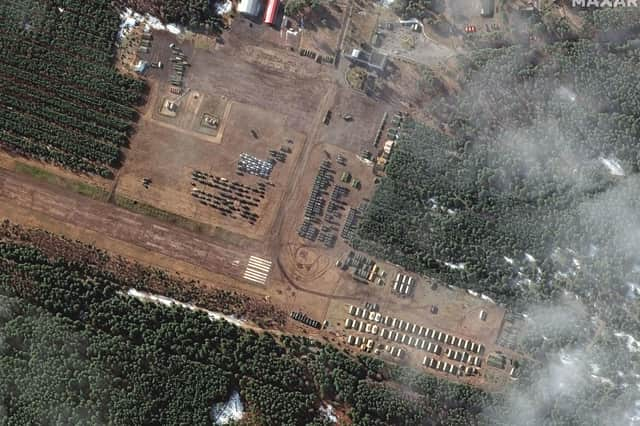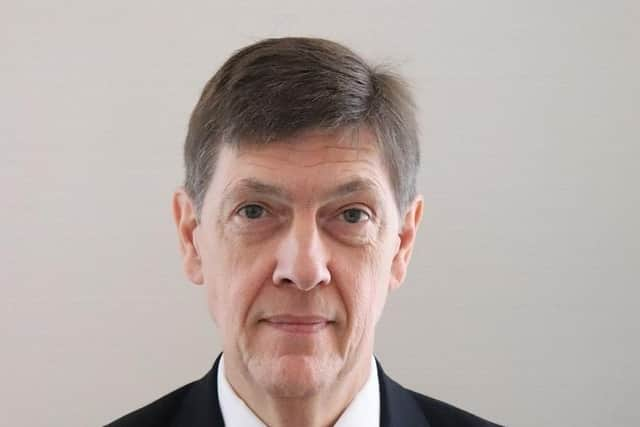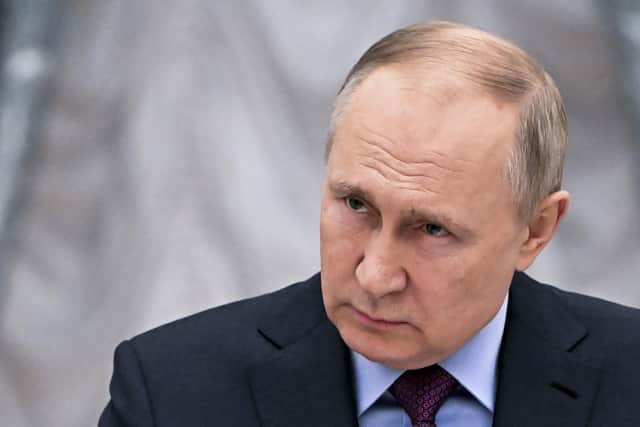Ukraine: Time for Britain to end ‘corrosive addiction to Russian money’, writes top former NATO diplomat David Hobbs


Some of those demands – as President Putin must have known – were non-starters, but both NATO and the United States provided careful and constructive responses where they could.
Advertisement
Hide AdAdvertisement
Hide Ad

President Putin then kept everyone guessing as his military build-up intensified. A procession of western leaders urged him to take the path of diplomacy, but to no avail. Was he was genuinely making his mind up or stringing people along until he was ready for his next move?
He made that move on Monday night after a theatrical “consultation” with his Security Council where, one-by-one, each member supported recognising ‘the Luhansk People’s Republic and ‘the Donetsk People’s Republic’ as independent states, although both are squarely inside Ukrainian territory.
Russia’s State Duma – the lower house of parliament – had recommended that several days earlier, and the Federation Council – the upper house - unanimously approved President Putin’s request to use Russian forces abroad.
Advertisement
Hide AdAdvertisement
Hide AdWith those “rubber stamps” in place, President Putin climbed up a rung on the escalation ladder, and the “what next” guessing game continues.


Russian forces will certainly move openly into the breakaway parts of Donbas – the Ukrainian region encompassing Donetsk and Luhansk – up to the “line of contact”, the front line between the separatists and Ukrainian forces.
For at least eight years, Russia has been fuelling separatist sentiments there and covertly assisting separatist forces.
The open presence of Russia forces there will remove any doubt that President Putin has again driven a coach and horses through any number of international laws, treaties, and norms.
Advertisement
Hide AdAdvertisement
Hide AdThe track record includes Russia’s occupation of Ukraine’s territory of Crimea in 2014 in a bold, so- called “hybrid” operation where “little green men” – soldiers with no insignia - gradually seized control. Russia denied responsibility until the takeover was complete, and then informed the world that it had fallen for a clever subterfuge.
Before that, back in 2008, a skirmish in a small region seeking independence from Georgia – another post-Soviet state – provided the pretext for Russian “peace-keeping” forces to occupy two regions. South Ossetia and Abkhazia are now Russian fiefdoms, recognized as states by only Russia, Venezuela, Nicaragua, Nauru and Syria.
President Putin is not short of options. One obvious would be to move beyond the line of contact. His “recognition” covers the entire territory of Donetsk and Luhansk, which includes the regions beyond the line of contact, under the control of Ukrainian forces. That would mean a direct conflict with Ukrainian forces would represent another major escalation.
But with forces positioned within striking distance of huge lengths of Ukraine’s borders, he has endless scope for broadening the conflict geographically, with actions ranging from opportunistic adventures almost anywhere right up to a full-scale onslaught.
Advertisement
Hide AdAdvertisement
Hide AdWhat “gains” is President Putin hoping to make? One is to thwart Ukraine’s aspirations to join NATO. He well knows that an active territorial dispute throws a very effective spanner in the works. But that is only part of it.
President Putin has seen many popular uprisings replace “strongman” regimes with governments determined to democratise their countries. He also feels that the “West” has fuelled those uprisings through aid and NGOs.
Ukraine is just next door, and memories of former President Viktor Yanukovych’s ousting in 2014 are still fresh, and that is not a model that he would like to gain traction in Russia.
That also explains President Putin’s gross misrepresentation of Ukraine’s government as illegitimate, aggressive, and oppressive, and western NGOs as malign forces. He has to portray the Ukrainian government as a failure, and threats those working with the West as spies and traitors..
Advertisement
Hide AdAdvertisement
Hide AdThe challenge, though, is to influence President Putin’s perception of his “balance sheet” by ensuring that each escalation comes at a high price, beyond the intrinsic costs of any particular actions.
For example, much as he might want to want to replace Ukraine’s government, he knows that while an invasion might succeed, occupying a huge country with population of forty million hostile people is a different matter.
But who knows? In Georgia, he could have opted for more aggressive action, but clearly judged that maintaining open wounds on its territory was a reasonable price to pay for keeping NATO membership at bay and being a permanent thorn in the side of Georgia’s government.
That might be the same with the occupation of separatist regions of Donbas. Now is the time for the international community to respond with sanctions that can be increased in severity with every escalation.
Advertisement
Hide AdAdvertisement
Hide AdThe current announcements are a mixed bag, but leaders have emphasised that that they have plenty more in reserve, and that they are prepared to implement them.
Russia will continue to try to divide Allies, but President Putin will have been disappointed that his actions so far have not produced any rifts beyond the natural differences among pluralistic, democratic countries have different perspectives on sanctions and strategies.
He will have been given pause by their unity, not just over the last few days, but throughout the crisis. And although he might shrug of the first round of sanctions, successive rounds can certainly hurt more.
And Germany’s Chancellor Olaf Scholz suspension of the opening of the Nord Stream 2 gas pipeline that would supply Russian gas directly to Germany already puts on display a fearsome fang.
Advertisement
Hide AdAdvertisement
Hide AdIt is not an outright cancellation, but it shows that Germany is prepared to endure hardship in facing up to Russia’s aggression.
And we must accept that Russia’s relationship with the world’s democracies has entered a new phase and we will have to keep our resolve in the long term.
President Putin is up for re-election in September – spoiler alert: he’ll win - and will not be changing
course. Despite our instincts, we have to think in the long term, and recognise that we are in a new era of strategic competition. We need to be determined and have “whole of government” responses to the challenges we face.
Advertisement
Hide AdAdvertisement
Hide AdOur nations need to shake their dangerous dependency on Russian energy supplies. That means a long-term strategy of diversification, not just a quick fix for temporary supply shortages. The quest for carbon neutrality also looks like a good strategic bet, for instance.
And the United Kingdom, which has been quick to criticise Europe’s “addiction” to Russian energy, must deal with its own equally corrosive addiction to Russian money. It is appalling that years after the House of Commons – as well as many excellent journalists and analysts – have exposed the problems, so little has been done. This undermines otherwise commendable efforts to embrace a new strategic reality.
Germany seems to have grasped its nettle. We should grab ours too.
David Hobbs is the former Secretary General of the NATO Parliamentary Assembly. He is currently CEO of the Atlantic Treaty Association of the United Kingdom. He lives in Ilkley.
Comment Guidelines
National World encourages reader discussion on our stories. User feedback, insights and back-and-forth exchanges add a rich layer of context to reporting. Please review our Community Guidelines before commenting.